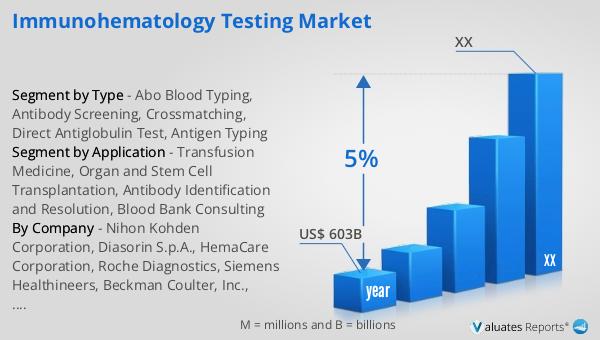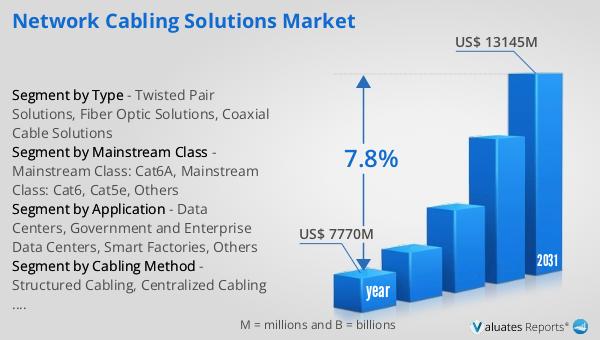What is Global Immunohematology Testing Market?
The Global Immunohematology Testing Market is a specialized segment within the broader medical diagnostics field that focuses on the study and analysis of blood and its components. This market encompasses a range of tests and procedures used to identify blood types, detect antibodies, and ensure compatibility for blood transfusions and organ transplants. Immunohematology testing is crucial for ensuring patient safety and effective treatment outcomes, particularly in scenarios where blood transfusions or organ transplants are necessary. The market includes various products and services such as reagents, instruments, and software used in laboratories and hospitals. These tests are essential for diagnosing and managing conditions like hemolytic disease of the newborn, autoimmune hemolytic anemia, and other blood-related disorders. The global demand for immunohematology testing is driven by the increasing prevalence of chronic diseases, advancements in medical technology, and the growing need for safe blood transfusion practices. As healthcare systems worldwide continue to evolve, the importance of accurate and reliable immunohematology testing cannot be overstated. This market plays a vital role in ensuring that patients receive the right type of blood or organ, thereby minimizing the risk of adverse reactions and improving overall healthcare outcomes.

Abo Blood Typing, Antibody Screening, Crossmatching, Direct Antiglobulin Test, Antigen Typing in the Global Immunohematology Testing Market:
Abo Blood Typing is a fundamental test in the Global Immunohematology Testing Market, used to determine an individual's blood group based on the presence or absence of A and B antigens on the surface of red blood cells. This test is crucial for blood transfusions, organ transplants, and pregnancy care to prevent hemolytic disease of the newborn. Antibody Screening is another essential procedure that detects the presence of unexpected antibodies in a patient's blood, which could cause adverse reactions during transfusions. This screening helps identify and mitigate potential risks, ensuring patient safety. Crossmatching is a critical step performed before blood transfusions to ensure compatibility between the donor's and recipient's blood. It involves mixing a small sample of the donor's red blood cells with the recipient's serum to check for any agglutination or hemolysis, indicating incompatibility. The Direct Antiglobulin Test (DAT), also known as the Coombs test, is used to detect antibodies or complement proteins attached to the surface of red blood cells. This test is vital for diagnosing conditions like autoimmune hemolytic anemia and hemolytic disease of the newborn. Antigen Typing involves identifying specific antigens on the surface of red blood cells, which is crucial for matching blood donors and recipients, especially in cases where multiple transfusions are required. This test helps prevent alloimmunization, a condition where the recipient's immune system attacks the transfused blood cells. Each of these tests plays a significant role in the Global Immunohematology Testing Market, contributing to the safety and efficacy of blood transfusions and organ transplants. The advancements in these testing methods have significantly improved patient outcomes, reduced the risk of transfusion-related complications, and enhanced the overall quality of healthcare services. As the demand for safe and effective blood transfusion practices continues to grow, the importance of these tests in the immunohematology market will only increase.
Transfusion Medicine, Organ and Stem Cell Transplantation, Antibody Identification and Resolution, Blood Bank Consulting in the Global Immunohematology Testing Market:
The Global Immunohematology Testing Market finds extensive usage in various areas of healthcare, including Transfusion Medicine, Organ and Stem Cell Transplantation, Antibody Identification and Resolution, and Blood Bank Consulting. In Transfusion Medicine, immunohematology testing is crucial for ensuring that blood transfusions are safe and effective. Tests like ABO Blood Typing, Antibody Screening, and Crossmatching are performed to ensure compatibility between the donor's and recipient's blood, thereby minimizing the risk of adverse reactions. In Organ and Stem Cell Transplantation, immunohematology testing plays a vital role in matching donors and recipients. Accurate antigen typing and antibody screening are essential to prevent transplant rejection and ensure the success of the procedure. Antibody Identification and Resolution involve identifying specific antibodies in a patient's blood that may cause complications during transfusions or transplants. This process helps healthcare providers develop appropriate treatment plans and select compatible blood or organ donors. Blood Bank Consulting services utilize immunohematology testing to provide expert advice on managing blood banks, ensuring the availability of safe and compatible blood products. These services include developing protocols for blood collection, storage, and transfusion, as well as training staff on best practices. The integration of advanced immunohematology testing methods in these areas has significantly improved patient outcomes, reduced the risk of transfusion-related complications, and enhanced the overall quality of healthcare services. As the demand for safe and effective blood transfusion and transplantation practices continues to grow, the importance of immunohematology testing in these areas will only increase.
Global Immunohematology Testing Market Outlook:
Based on our research, the global market for medical devices is projected to reach approximately US$ 603 billion by the year 2023, with an anticipated growth rate of 5% CAGR over the next six years. This substantial market size underscores the critical role that medical devices play in modern healthcare systems worldwide. The consistent growth rate reflects ongoing advancements in medical technology, increasing healthcare expenditures, and the rising prevalence of chronic diseases that necessitate the use of sophisticated medical devices. The market encompasses a wide range of products, including diagnostic equipment, surgical instruments, and monitoring devices, all of which contribute to improving patient care and treatment outcomes. As healthcare providers continue to adopt innovative technologies to enhance diagnostic accuracy and therapeutic efficacy, the demand for advanced medical devices is expected to remain robust. This growth trajectory highlights the importance of continuous research and development in the medical device sector to address emerging healthcare challenges and meet the evolving needs of patients and healthcare professionals. The global medical device market's expansion is a testament to the sector's resilience and its pivotal role in advancing global health.
| Report Metric | Details |
| Report Name | Immunohematology Testing Market |
| Accounted market size in year | US$ 603 billion |
| CAGR | 5% |
| Base Year | year |
| Segment by Type |
|
| Segment by Application |
|
| By Region |
|
| By Company | Nihon Kohden Corporation, Diasorin S.p.A., HemaCare Corporation, Roche Diagnostics, Siemens Healthineers, Beckman Coulter, Inc., Abbott Laboratories, Grifols, S.A., Ortho Clinical Diagnostics, bioMérieux, Alere, Inc., Becton, Dickinson and Company (BD), Thermo Fisher Scientific, Diamedix Corporation, Immucor, Inc., Agilent Technologies, Inc., Haemonetics Corporation, Luminex Corporation, Bio-Rad Laboratories, Inc., Sysmex Corporation |
| Forecast units | USD million in value |
| Report coverage | Revenue and volume forecast, company share, competitive landscape, growth factors and trends |
